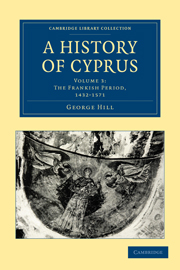Book contents
- Frontmatter
- Contents
- Volume III (1432–1571)
- Chapter IX John II, 1432–58
- Chapter X Charlotte and Louis of Savoy, 1458–64
- Chapter XI James II, 1464–73
- Chapter XII Catherine and James III. Catherine alone, 1473–89
- Chapter XIII Cyprus under Venice
- Chapter XIV The War of Cyprus. I. The Expedition of 1570
- Chapter XV The War of Cyprus. II. The Turkish Conquest
- Chapter XVI The Two Churches, 1220–1571
- Chapter XVII Literature and the Fine Arts
- Note on some Authorities
- Genealogy of the Lusignan Dynasty
- Addenda
- Index
- MEDIEVAL CYPRUS
- Plate section
Chapter XIII - Cyprus under Venice
Published online by Cambridge University Press: 07 June 2011
- Frontmatter
- Contents
- Volume III (1432–1571)
- Chapter IX John II, 1432–58
- Chapter X Charlotte and Louis of Savoy, 1458–64
- Chapter XI James II, 1464–73
- Chapter XII Catherine and James III. Catherine alone, 1473–89
- Chapter XIII Cyprus under Venice
- Chapter XIV The War of Cyprus. I. The Expedition of 1570
- Chapter XV The War of Cyprus. II. The Turkish Conquest
- Chapter XVI The Two Churches, 1220–1571
- Chapter XVII Literature and the Fine Arts
- Note on some Authorities
- Genealogy of the Lusignan Dynasty
- Addenda
- Index
- MEDIEVAL CYPRUS
- Plate section
Summary
On the removal from Cyprus of the last of its independent rulers, followed a drastic reorganization of the administration, on lines which had been indicated by measures already taken after the death of James II, and which in a year or two assumed the form which was to remain in essentials unaltered during the eighty years of Venetian domination.
The disappearance of the monarchy carried as its corollary the suppression of the Haute Cour. That was a body of which the King was, constitutionally, only the chief among the members; nevertheless it had sunk to be a mere instrument in the hands of the King. After the death of James II the Governors had practically taken the reins out of the nerveless hands of the Haute Cour; it did not meet again in full assembly until 28 April 1475, when the Queen had returned to Nicosia. Such business as it continued to transact must have been of small importance (such as the question of marriage of widows), and although the Queen might appear to be functioning as a sovereign her acts were really dictated by the Counsellors appointed by Venice, who were instructed, as we have seen (p. 707), to maintain the pretence of acting in her name. With the abolition of the royal authority, and of the Haute Cour, Cyprus came, like all other possessions of Venice, in form as well as in actuality, under the legislative authority of the Senate and Great Council, and judicial functions which had been left to the Haute Cour were taken over by the magistrates sent out to the island.
- Type
- Chapter
- Information
- A History of Cyprus , pp. 765 - 877Publisher: Cambridge University PressPrint publication year: 2010First published in: 1948

